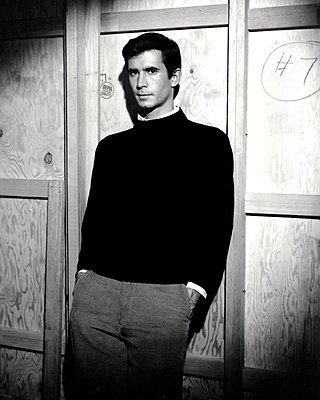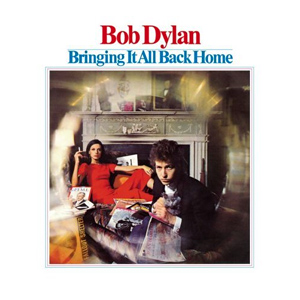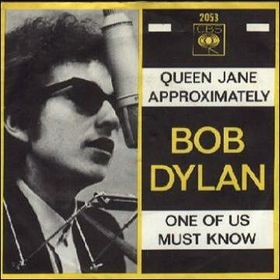Related Research Articles

Psycho is a 1960 American horror film produced and directed by Alfred Hitchcock. The screenplay, written by Joseph Stefano, was based on the 1959 novel of the same name by Robert Bloch. The film stars Anthony Perkins, Janet Leigh, Vera Miles, John Gavin and Martin Balsam. The plot centers on an encounter between on-the-run embezzler Marion Crane (Leigh) and shy motel proprietor Norman Bates (Perkins) and its aftermath, in which a private investigator (Balsam), Marion's lover Sam Loomis (Gavin) and her sister Lila (Miles) investigate her disappearance.

Norman Bates is a fictional character created by American author Robert Bloch as the main protagonist in his 1959 horror novel Psycho. He has an alter, Mother, who takes from the form of his abusive mother, and later victim, Norma, who in his daily life runs the Bates Motel.

Blonde on Blonde is the seventh studio album by the American singer-songwriter Bob Dylan, released as a double album on June 20, 1966, by Columbia Records. Recording sessions began in New York in October 1965 with numerous backing musicians, including members of Dylan's live backing band, the Hawks. Though sessions continued until January 1966, they yielded only one track that made it onto the final album—"One of Us Must Know ". At producer Bob Johnston's suggestion, Dylan, keyboardist Al Kooper, and guitarist Robbie Robertson moved to the CBS studios in Nashville, Tennessee. These sessions, augmented by some of Nashville's top session musicians, were more fruitful, and in February and March all the remaining songs for the album were recorded.

Bringing It All Back Home is the fifth studio album by the American singer-songwriter Bob Dylan, released in March 1965 by Columbia Records. In a major transition from his earlier sound, it was Dylan's first album to incorporate electric instrumentation, which caused controversy and divided many in the contemporary folk scene.

Another Side of Bob Dylan is the fourth studio album by the American singer and songwriter Bob Dylan, released on August 8, 1964, by Columbia Records.

Renaldo and Clara is a 1978 American film directed by Bob Dylan and starring Bob Dylan, Sara Dylan and Joan Baez. Written by Dylan and Sam Shepard, the film incorporates three distinct film genres: concert footage, documentary interviews, and dramatic fictional vignettes reflective of Dylan's song lyrics and life.
"4th Time Around" is a song by American singer-songwriter Bob Dylan, which was released as the 12th track on his seventh studio album Blonde on Blonde on June 20, 1966. The song was written by Dylan and produced by Bob Johnston. Commentators often interpret it as a parody of the Beatles' 1965 song "Norwegian Wood ". John Lennon composed "Norwegian Wood" after being influenced by the introspective lyrics of Dylan. Lennon later reflected on his feelings of paranoia when Dylan first played him "4th Time Around".
"Talkin' World War III Blues" is a song written and performed by the American singer-songwriter Bob Dylan that was first released as the tenth track of his 1963 album The Freewheelin' Bob Dylan. Like nearly every song on the album, it is performed by Dylan solo, accompanying himself on acoustic guitar and harmonica played in a rack.
"Absolutely Sweet Marie" is a song by American singer-songwriter Bob Dylan, which was released on the third side of the double album and Dylan's seventh studio album, Blonde on Blonde (1966). The song was written by Dylan and produced by Bob Johnston. It was recorded at around 1:00 am on March 8, 1966, at Columbia Studio A, Nashville. Some commentators have interpreted the song as being about sexual frustration.

Psycho is a 1998 American psychological horror film produced and directed by Gus Van Sant, and starring Vince Vaughn, Julianne Moore, Viggo Mortensen, William H. Macy, and Anne Heche. It is a modern remake of Alfred Hitchcock's 1960 film of the same name, in which an embezzler arrives at an old motel run by a mysterious man named Norman Bates; both films are adapted from Robert Bloch's 1959 novel.

Psycho is an American horror franchise consisting of six films loosely based on the Psycho novels by Robert Bloch: Psycho, Psycho II, Psycho III, Bates Motel, Psycho IV: The Beginning, the 1998 remake of the original film, and additional merchandise spanning various media. The first film, Psycho, was directed by filmmaker Alfred Hitchcock. Subsequently, another film related to the series was made: an Alfred Hitchcock biopic, and two new novels, by Takekuni Kitayama and Chet Williamson, were released. Also, an independent documentary called The Psycho Legacy was released on October 19, 2010, mostly focusing on Psycho II, Psycho III and Psycho IV: The Beginning, while covering the impact and legacy of the original film.

Psycho is a 1959 horror novel by American writer Robert Bloch. The novel tells the story of Norman Bates, a caretaker at an isolated motel who struggles under his domineering mother and becomes embroiled in a series of murders. The novel is considered Bloch's most enduring work and one of the most influential horror novels of the 20th century.

"One of Us Must Know (Sooner or Later)" is a song by American singer-songwriter Bob Dylan, which was released as a single on February 14, 1966, and as the fourth track on his seventh studio album Blonde on Blonde in June of that year. The song was written by Dylan and produced by Bob Johnston. It is the narrator's account of a burned-out relationship. It was recorded at Columbia studio A in New York on January 25, 1966, with Dylan and other musicians developing the song through over twenty takes during the session.

Norma Bates is a fictional character created by American author Robert Bloch in his 1959 thriller novel Psycho. She is the deceased mother and victim of serial killer Norman Bates, who had recreated her in his mind as a murderous alternate personality.
"I Am a Lonesome Hobo" is a song written and recorded by Bob Dylan, released in 1967 on his eighth studio album, John Wesley Harding. The song was produced by Bob Johnston.
"Bob Dylan's 115th Dream" is a song by Bob Dylan, released on his fifth album, Bringing It All Back Home. In 2005, Mojo magazine rated the song as the 68th greatest Bob Dylan song.

Marion Crane is a fictional character of Robert Bloch's 1959 thriller novel Psycho and portrayed by Janet Leigh in Alfred Hitchcock's 1960 film adaptation. She was later played by Anne Heche in the 1998 remake and Rihanna in the television series Bates Motel (2017).
"The Murder" is a cue in the cinematic score written and composed by Bernard Herrmann for the horror-thriller film Psycho (1960) directed by Alfred Hitchcock. The score, its second movement in particular, is well recognized as one of the most famous scores in film history. It's composed for an original orchestra's string section.
"Po' Boy" is an acoustic folk/jazz song written and performed by American singer-songwriter Bob Dylan that appears as the tenth song on his 2001 album Love and Theft. It was anthologized on the compilation album Dylan in 2007. Like most of Dylan's 21st century output, he produced the song himself under the pseudonym Jack Frost.
Motorpsycho may refer to:
References
- ↑ Neil Corcoran (December 15, 2010). Do You Mr Jones?: Bob Dylan with the Poets and Professors. Random House. p. 161. ISBN 978-1-4464-1332-6.
- ↑ Heylin, Clinton. Revolution in the Air: The Songs of Bob Dylan Vol.1 :1957–73 ISBN 978-1-84901-296-6
- ↑ "Motorpsycho Nightmare | The Official Bob Dylan Site". www.bobdylan.com. Retrieved January 3, 2021.
- ↑ "Motopsycho nightmare: the meaning of the song and the lyrics | Untold DylanUntold Dylan". November 25, 2015. Retrieved January 3, 2021.
- ↑ Wilentz, Sean (June 19, 2021). "Bob Dylan, Historian". The New York Review of Books. Retrieved July 5, 2021.